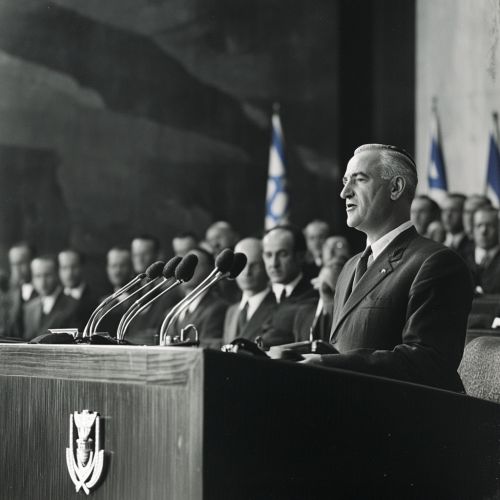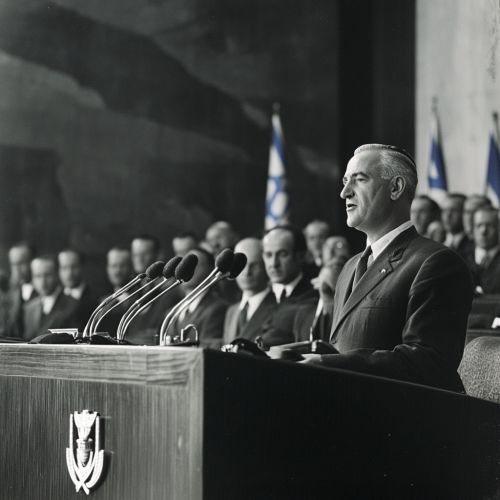History of the State of Israel
Early History and Zionist Movement
The history of the State of Israel is deeply rooted in the ancient history of the land of Israel, which has been significant to the Jewish People for millennia. The area known today as Israel has been inhabited since prehistoric times and has seen the rise and fall of many civilizations, including the Canaanites, Philistines, and Israelites. The Jewish connection to the land dates back to biblical times, with the establishment of the ancient kingdoms of Israel and Judah.
The modern political movement for the re-establishment of a Jewish homeland in Palestine, known as Zionism, began in the late 19th century. Theodor Herzl, often considered the father of modern political Zionism, convened the First Zionist Congress in Basel, Switzerland, in 1897. The congress aimed to establish a home for the Jewish people in Palestine secured by public law. The Balfour Declaration of 1917, issued by the British government, further supported the establishment of a "national home for the Jewish people" in Palestine.
British Mandate and Jewish Immigration
Following World War I, the League of Nations granted Britain the mandate over Palestine. The British Mandate period (1920-1948) saw significant Jewish immigration to the region, driven by the Aliyot (waves of Jewish immigration). The Jewish population in Palestine grew from about 83,000 in 1922 to approximately 600,000 by 1947. This period also saw the development of Jewish institutions, such as the Histadrut (General Federation of Labor) and the Jewish Agency, which played crucial roles in the establishment of the future state.
The increasing Jewish immigration and land purchases led to tensions and conflicts with the Arab population, culminating in several violent outbreaks, including the 1929 Hebron massacre and the Arab Revolt of 1936-1939. The British government issued the White Paper of 1939, limiting Jewish immigration and land purchases, which was met with strong opposition from the Jewish community.
World War II and the Holocaust
World War II and the Holocaust had a profound impact on the Jewish community worldwide. The systematic extermination of six million Jews by the Nazis underscored the urgent need for a Jewish homeland. After the war, the plight of Jewish refugees and displaced persons further intensified the demand for a Jewish state. The Haganah, the main Jewish paramilitary organization, along with other groups such as the Irgun and Lehi, intensified their efforts against British rule, leading to increased violence and international pressure on Britain to resolve the situation in Palestine.
United Nations Partition Plan and Independence
In 1947, the United Nations proposed a partition plan to divide Palestine into separate Jewish and Arab states, with Jerusalem under international administration. The plan was accepted by the Jewish leadership but rejected by the Arab states and the Palestinian Arab leadership. On May 14, 1948, David Ben-Gurion, the head of the Jewish Agency, declared the establishment of the State of Israel. The declaration was met with immediate recognition by the United States and the Soviet Union, among others.


Arab-Israeli Conflict and Wars
The declaration of independence was followed by the 1948 Arab-Israeli War, as neighboring Arab states invaded the newly established state. Despite being outnumbered, the Israeli forces managed to secure victory and expand the territory beyond the UN partition plan borders. The war resulted in significant demographic changes, including the displacement of Palestinian Arabs and the exodus of Jews from Arab countries.
Subsequent conflicts, including the Suez Crisis of 1956, the Six-Day War of 1967, and the Yom Kippur War of 1973, further shaped the geopolitical landscape of the region. The Six-Day War resulted in Israel capturing the West Bank, Gaza Strip, Sinai Peninsula, and Golan Heights, significantly altering the territorial boundaries and leading to ongoing disputes and negotiations.
Peace Processes and Modern Developments
Efforts to achieve peace between Israel and its neighbors have been ongoing, with varying degrees of success. The Camp David Accords of 1978 led to the Egypt–Israel Peace Treaty in 1979, marking the first peace agreement between Israel and an Arab country. The Oslo Accords of the 1990s initiated a peace process between Israel and the Palestine Liberation Organization (PLO), leading to the establishment of the Palestinian Authority and partial self-governance in parts of the West Bank and Gaza.
Despite these efforts, the Israeli-Palestinian conflict remains unresolved, with periodic outbreaks of violence and ongoing disputes over settlements, borders, and the status of Jerusalem. The Second Intifada (2000-2005) and subsequent conflicts, such as the 2006 Lebanon War and the Gaza Wars, have further complicated the peace process.
Society, Culture, and Economy
The State of Israel has developed a diverse and dynamic society, with a population comprising Jews from various ethnic backgrounds, including Ashkenazi, Sephardi, and Mizrahi communities, as well as a significant Arab minority. Israel is known for its vibrant cultural scene, including contributions to literature, music, theater, and the arts. The revival of the Hebrew language is one of the notable cultural achievements of the Zionist movement.
Economically, Israel has transformed from a primarily agrarian society to a high-tech powerhouse, often referred to as the "Start-Up Nation." The country's economy is characterized by a strong technology sector, advanced research and development, and a high level of innovation. Key industries include information technology, biotechnology, defense, and agriculture.
